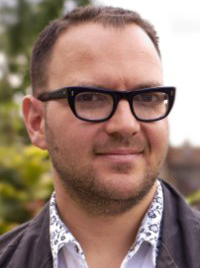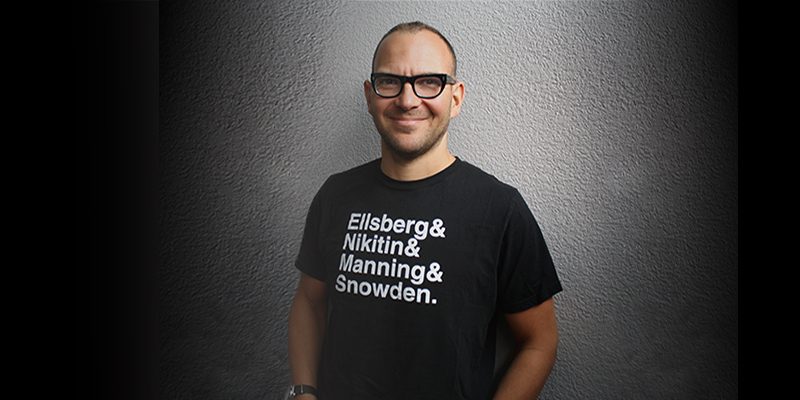Cory Doctorow: Peak Indifference
 Ever since the first days of public access to the Internet, activists like me have been making dire warnings about the privacy implications of leaving data-trails behind you when you engage in everyday activity. We hoped that people would think forward to the potential risks of disclosures down the road – that the individually harmless crumbs of personal information could be painstakingly, disastrously aggregated by criminals, or repressive governments, or creepy stalkers, or overweening employers, or well-intentioned authority figures who nevertheless drew false conclusions from their peek into our lives.
Ever since the first days of public access to the Internet, activists like me have been making dire warnings about the privacy implications of leaving data-trails behind you when you engage in everyday activity. We hoped that people would think forward to the potential risks of disclosures down the road – that the individually harmless crumbs of personal information could be painstakingly, disastrously aggregated by criminals, or repressive governments, or creepy stalkers, or overweening employers, or well-intentioned authority figures who nevertheless drew false conclusions from their peek into our lives.
We totally failed.
Every year, the Internet’s reach and popularity has grown. Every year, the extent to which Internet users’ privacy is compromised has also grown.
To be fair to privacy advocates, we have a good excuse. It’s really hard to get people to care about dangers that are far in the future, especially when the action that puts you in danger and the consequences of that action are separated by an unbridgeable gap of time and space. Privacy disclosures are a public health problem, like smoking. No one puff on a cigarette will definitely give you cancer, but take enough puffs and you’ll virtually guarantee cancer, eventually. No one act of disclosure of personal information will harm you, but once enough disclosures have taken place, over enough time, you’re going to get into serious privacy trouble.
For decades, public health advocates tried to get people to care about cancer, without much success. They, too, had a good excuse. Smoking gives a short term benefit (relief from addictive cravings) and its costs are way down the road. To make things worse, the companies that profited from smoking engaged in powerful, well-funded disinformation campaigns to make it harder for their customers to perceive the distant harms, let alone become anxious about them.
Smoking is now in decline (though vaping is proving to be a powerful gateway to smoking), but it was a long time getting there. Even when lifelong smokers got their cancer diagnoses, it was too late, and many became cancer nihilists, continuing to smoke even as they received treatment, or died slow and painful deaths. The combination of the short-term pleasure of smoking and the lack of any meaningful way to reverse the harms that had already occurred is a surefire recipe for nihilism: why deprive yourself of smoking’s joys if it isn’t going to make a difference?
However, smoking is in decline, because the evidence of smoking’s harms became undeniable over time. At a certain point, indifference to tobacco’s dangers peaked – long before actual tobacco use peaked. Peak indifference marks a turning point. Once the number of people who care about your issue begins to grow on its own, without your needing to wheedle them about confronting long-term harms, you can switch tactics for something much easier. Rather than trying to get people to care about the issue, now you need to get them to do something about it.
The anti-smoking movement made great strides with this. They made sure that people who had cancer – or whose loved ones did – understood that tobacco’s use wasn’t a blameless, emergent phenomenon. They named names and published documents, showing exactly who conspired to destroy lives with cancer in order to enrich themselves. They surfaced and highlighted the risks to non-smokers’ lives from smoking: not just second-hand smoke, but also the public health burdens and the terrible losses felt by survivors after their loved ones had perished. They demanded architectural changes – bans on smoking – and legal ones, and market ones, and normative ones. Peak indifference let those activists move from convincing to fighting back.
That’s why it’s time for privacy activists to start thinking of new tactics. We are past peak indifference to online surveillance: that means that there will never be a moment after today in which fewer people are alarmed by the costs of surveillance. The bad news is that 20 years of failing to convince people of the risks of online privacy has built up a reservoir of inevitable harms: all the data collected in giant databases today will breach someday, and when it does, it will ruin peoples’ lives. They will have their houses stolen from under them by identity thieves who forge their deeds (this is already happening); they will end up with criminal records because identity thieves will use their personal information to commit crimes (this is already happening); they will be accused of terrorism or other life-destroying categories of crimes because an algorithm has mined their data to come to a conclusion they aren’t allowed to see or interrogate (this is already happening); they will have their devices compromised using passwords and personal data that leaked from old accounts, and the hackers will spy on them through their baby monitors, cars, set-top boxes, and medical implants (this is already happening); they will have the sensitive information they disclosed to the government to attain security clearance breached and warehoused by blackmailing enemy states (this is already happening); their employers will fail when their personal information is used to commit industrial espionage (this is already happening).
Etc.
From Ashley Madison to Office of Personnel Management, the future is clear: every couple weeks, from now on and for the foreseeable, a couple million people whose lives were just destroyed by a data breach will sheepishly show up on privacy advocates’ doorsteps, ashen-faced like smokers who’ve just received cancer diagnoses, saying, ‘‘I guess you were right. What do we do?’’
Therein lies our opportunity. We can point to the specific people who told us privacy is dead while spending hundreds of millions of dollars protecting themselves from scrutiny – by buying up adjacent houses and keeping them empty (as Facebook CEO Mark Zuckerberg did); by threatening journalists who disclosed their personal information (as ex-Google CEO Eric Schmidt did); by using offshore tax havens to disguise their financial crimes (as many of those named in the Panama Papers did). These are people who said, ‘‘Privacy is dead,’’ but meant: ‘‘If you believe your privacy is dead, I will be much, much richer.’’
We have to name names, make it clear that living people engineered a privacy denial movement whose template was Big Tobacco’s cancer denial movement.
We have to provide courses of action: privacy-protecting tools that let people fight back against the surveillance economy; political campaigns that hang cryptography-fighting politicians and spies up by their ankles and subject them to public ridicule; legal opportunities to seek redress from the surveillance profiteers.
If we can give privacy’s victims a course of action, a movement they can join, they will fight with us. If we can’t, they will become privacy nihilists, continuing to hemorrhage personal information for the short-term gain of social attention, making themselves into easy prey for spies, crooks, creeps, and voyeurs.
It’s up to us.
Cory Doctorow is the author of Walkaway, Little Brother, and Information Doesn’t Want to Be Free (among many others); he is the co-owner of Boing Boing, a special consultant to the Electronic Frontier Foundation, a visiting professor of Computer Science at the Open University and an MIT Media Lab Research Affiliate.
From the July 2016 issue of Locus Magazine







There’s another option for the people: individuals can be given the equipment and knowledge to perform a surveillance of their own upon the governments, authority figures, employers, stalkers and criminals. The people now have the technology to spy on any individual, group and entity that spies on them.
Not only to spy on them–to identify and expose them to the public. What they can do to us, we can do to them. Turnabout is fair play, as it should be in the United States and the rest of the free world. It is the right, and the duty, for the people to reach out to one another, to guard, protect and defend the privacy and security of the people. Evidently, nobody is willing to do this for the people, except the people themselves.
People need not wait until they become privacy’s victims before they take the course of action. We may all be potential prey, so we must get busy and do what we can about the predators.
“… (though vaping is proving to be a powerful gateway to smoking)…”
Please remove this falsehood from your article. The truth is the exact opposite.
Well, yes and no. Vaping on its own doesn’t have to be bad and can be very helpful, BUT the industries are getting many dangerous elements including the same bad agents (through the liquids etc) in the system. This happened very quickly after vaping became a thing, and as such while we could have a world where vaping would enable a better world, people actually have to actively prohibit vaping in spaces.
Thanks for this clearly argued and brilliant wakeup call, Cory. I hope it receives the wide attention it so richly deserves.
Keeping with the analogy, locusmag.com is like the tobacco industry because they don’t even minimally protect our privacy by using https? We should stop smoking Locus?
I’m sure Locus doesn’t care about my privacy so I’ll put this in terms they can understand. Myself and many others that are actually part of privacy communities refuse to link to sites that don’t live up to a minimum standard. Your privacy article would get more clicks if you threw us a small bone for privacy.
Join the modern world and use encryption.